
What is LMS? A Complete Guide to Learning Management Systems
Imagine logging into one place where every course, training, and resource you need is right there. That’s exactly what a Learning Management System (LMS) does. It is more than just software it has become the backbone of modern learning for both workplaces and classrooms.
✨
Quick Read
Summary generated by AI, reviewed for accuracy.
A Learning Management System (LMS) is more than software it’s a complete hub for training, compliance, and growth. By 2025, it will be essential for businesses and schools to cut costs, boost engagement, and deliver consistent learning anywhere.
The best LMS platforms like LMS 365, Docebo, and TalentLMS offer features such as mobile learning, gamification, and analytics to make training smarter and faster. Choosing the right system today ensures your teams and students are future-ready.
Instead of relying on paper manuals or scattered online files, an LMS makes learning easy, organized, and available anytime, anywhere. According to eLearning Industry, over 90% of large companies already use a Learning Management System to train their workforce. By 2025, organizations that adopt LMS will save costs, engage people better, and stay ahead of competitors.
What is a Learning Management System (LMS)?
A Learning Management System (LMS) is a digital hub that allows organizations to design, deliver, monitor, and manage training or educational programs in one place. Instead of depending on outdated paper manuals or scattered tools, schools and businesses now rely on LMS to keep learning structured, secure, and easy to access.
Think of it as a central station for learning where courses, quizzes, resources, and progress reports all connect. Employees can finish their training modules, students can learn anytime from any device, and managers or teachers can instantly track performance without confusion.
As TechTarget highlights, modern LMS platforms include powerful features such as course management, real-time reporting, mobile access, and certification tracking. These capabilities make LMS a key driver of professional growth and education in today’s digital-first world.
Key Characteristics of an LMS
- Course Delivery: Upload and organize training or academic content in one place.
- Tracking & Reporting: Monitor learner progress, completion rates, and knowledge retention.
- User Management: Assign courses, roles, and permissions to different users.
- Accessibility: Anytime, anywhere access via web or mobile devices.
- Engagement Tools: Gamification, quizzes, and discussion forums.
Why LMS 365 is Essential in 2025
The shift toward hybrid workplaces and online education has accelerated the demand for smarter training solutions. Organizations that depend on outdated training methods face delays, inconsistent learning results, and high costs. LMS 365 solves these challenges by automating processes, integrating with Microsoft 365, and engaging learners more effectively.
Key Reasons It Matters Today
Remote & Hybrid Work – With teams spread across locations, training can be delivered directly inside Microsoft Teams and SharePoint, ensuring consistent learning experiences across geographies.
Employee Training & Onboarding – A structured onboarding journey speeds up new hire readiness. Automated workflows, digital checklists, and self-paced courses reduce confusion and help employees feel productive from day one.
Compliance Management – Industries like healthcare, finance, and manufacturing rely on built-in compliance tracking and automated certifications to meet regulatory requirements and stay audit-ready.
Upskilling & Reskilling – According to the LinkedIn Workplace Learning Report, 94% of employees would stay longer at companies that invest in career development. Continuous learning, personalized training paths, and real-time progress tracking make this possible.
Core Features of a Learning Management System
A Learning Management System (LMS) goes far beyond being a simple storehouse of courses it serves as a central hub for all learning activities. It’s built to make training more engaging, interactive, and effortless to manage. Modern LMS platforms combine essential tools that not only simplify learning for employees and students but also give administrators complete visibility and control. Together, these features create an environment where learning is structured, measurable, and impactful.
1. Course Creation & Management
Every organization has unique training needs. An LMS makes it easy to design courses with documents, videos, presentations, and even interactive modules. Trainers can structure lessons step by step, upload materials, and keep everything in one place. This ensures learners don’t waste time searching for resources. Courses can also be updated anytime, so the content always stays relevant.
2. User-Friendly Dashboards
A confusing system kills motivation. That’s why the best learning management systems use intuitive dashboards where learners can see their assigned courses, progress, deadlines, and achievements in one glance. For administrators, dashboards provide quick access to learner performance, upcoming sessions, and system updates all without clicking through endless menus.
3. Mobile Learning
In today’s fast-moving world, learners don’t want to be tied to a desk. Mobile-friendly LMS platforms allow employees and students to access training on smartphones and tablets, anytime, anywhere. Whether it’s during a commute, at home, or on the job site, learning becomes flexible and convenient. This flexibility increases completion rates and keeps learning continuous.
4. Assessments & Quizzes
Learning only matters if it sticks. With built-in assessments, quizzes, and tests, an LMS helps trainers evaluate how much knowledge learners retain. These assessments can be interactive, with instant results that show strengths and weaknesses. Some platforms even allow timed tests and randomized questions for fair, unbiased evaluations.
5. Reports & Analytics
Data turns training into strategy. Reports and analytics in an LMS allow managers to track participation, completion rates, performance trends, and even skill gaps across teams. Instead of guessing who needs support, leaders can use data to make informed decisions about promotions, training investments, and compliance requirements.
6. Gamification Tools
Training doesn’t have to be boring. Gamification features like points, badges, and leaderboards make learning engaging and competitive in a fun way. Employees or students feel rewarded for progress, which motivates them to keep going. According to TalentLMS, 83% of employees who receive gamified training feel more motivated to learn.
7. Certification Tracking
Many industries require compliance training and certifications. An LMS automates this process by issuing digital certificates once a learner completes a course. These certificates can be stored, shared, and renewed easily, helping businesses stay audit-ready and employees showcase their skills.
According to eLearning Industry, organizations that implement these LMS features experience up to 60% faster employee training completion rates, showing how powerful the right features can be.
Benefits of Using a Learning Management System
Implementing a Learning Management System (LMS) goes far beyond making training convenient it transforms how organizations teach, learn, and grow. An LMS not only saves time but also delivers measurable results that directly impact productivity, engagement, and compliance. Let’s explore the key benefits in detail.
1. Saves Time & Cuts Costs
Traditional training can be expensive, requiring classrooms, travel, printed materials, and trainers. An LMS eliminates most of these costs by moving everything online. Automated onboarding, compliance courses, and digital resources save valuable HR hours. According to Brandon Hall Group, companies that switch to eLearning spend 40–60% less on training compared to traditional methods.
2. Boosts Engagement
Engagement is critical for effective learning. The best learning management systems use gamification tools like points, badges, and leaderboards, along with interactive quizzes and real-time feedback. These features make learning fun and rewarding. Engaged learners not only complete courses faster but also retain knowledge better, driving long-term results.
3. Improves Knowledge Retention
When training is delivered in bite-sized modules and reinforced through repetition, learners are more likely to remember what they’ve learned. LMS platforms often include microlearning and spaced learning techniques that increase retention. In fact, the Research Institute of America found that eLearning boosts knowledge retention by 25–60% compared to face-to-face training.
4. Enhances Productivity
An LMS makes training faster, simpler, and more accessible. Employees no longer wait for scheduled sessions; they can learn at their own pace and apply skills immediately on the job. Managers also save time with automated reporting and streamlined approvals. The result is a more productive workforce with less downtime.
5. Ensures Compliance & Reduces Risk
For industries like healthcare, finance, and manufacturing, compliance training is non-negotiable. Missing deadlines or failing audits can cost thousands. An LMS reduces this risk by sending automated reminders, tracking completion, and issuing digital certificates. This way, organizations stay audit-ready and compliant at all times.
6. Supports Remote & Hybrid Teams
In today’s global workforce, employees often work across cities, countries, or time zones. An LMS ensures training is consistent no matter where learners are located. Mobile-friendly platforms also make it possible for employees to complete courses from home, while traveling, or on the job site, ensuring equal opportunities for growth.
According to Deloitte, organizations using digital HR and learning platforms save up to 30% of their HR team’s time, proving the real impact of LMS adoption.
10 Best Learning Management Systems
Choosing the best learning management system in 2025 can be difficult, with so many platforms on the market. Below, we break down the leading options starting with LMS 365 so you can compare features, pricing, and integrations side by side.
1. LMS 365 – All-in-One Learning Platform
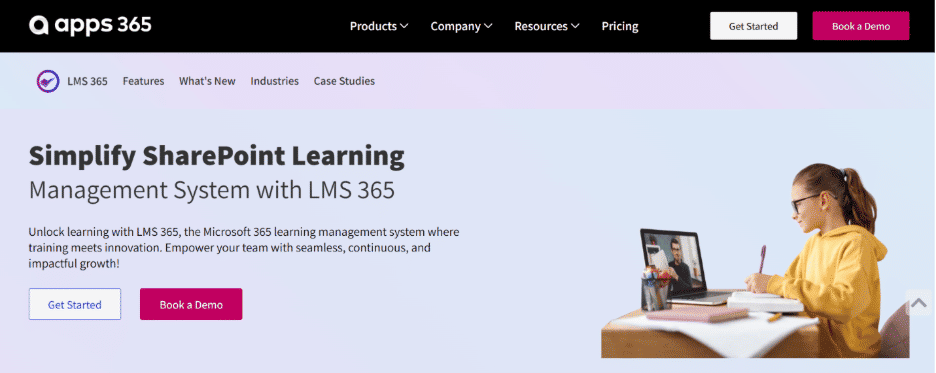
Description: LMS 365 integrates natively with Microsoft Teams and SharePoint, turning training into a seamless part of daily work. Perfect for organizations that want learning tied directly into productivity tools.
Key Features:
- Microsoft 365, Teams, and SharePoint integration
- Multimedia course creation with quizzes
- Mobile-ready platform
- Gamification (leaderboards, badges, points)
- Advanced analytics and reporting
- Certification tracking for compliance
Pricing: Flexible subscription-based pricing, scalable from SMBs to global enterprises.
Integration: Works with Microsoft 365 apps, HR systems, and third-party tools through APIs.
2. Moodle – Open-Source Learning Powerhouse

Description: Moodle is one of the most widely used open-source LMS platforms, especially in academic settings. It offers maximum flexibility with thousands of plugins and a large global community.
Key Features:
- Fully open-source and customizable
- Course creation with SCORM and multimedia support
- Discussion forums and collaboration tools
- Large library of third-party plugins
- Multilingual support
Pricing: Free to use; costs involve hosting, setup, and support services.
Integration: Supports integrations via plugins; works with Google Apps, Zoom, and more.
3. TalentLMS – Affordable and User-Friendly

Description: TalentLMS is cloud-based and designed for simplicity, making it a strong choice for small to mid-sized businesses looking to train employees quickly.
Key Features:
- Easy course creation with drag-and-drop
- Gamification features for engagement
- Custom branding and white-labeling
- Mobile learning support
- Reporting dashboards
Pricing: Free plan for up to 5 users; paid plans start at $69/month for small teams.
Integration: Works with Zoom, Salesforce, Google Workspace, and Slack.
4. Docebo – AI-Powered Enterprise LMS
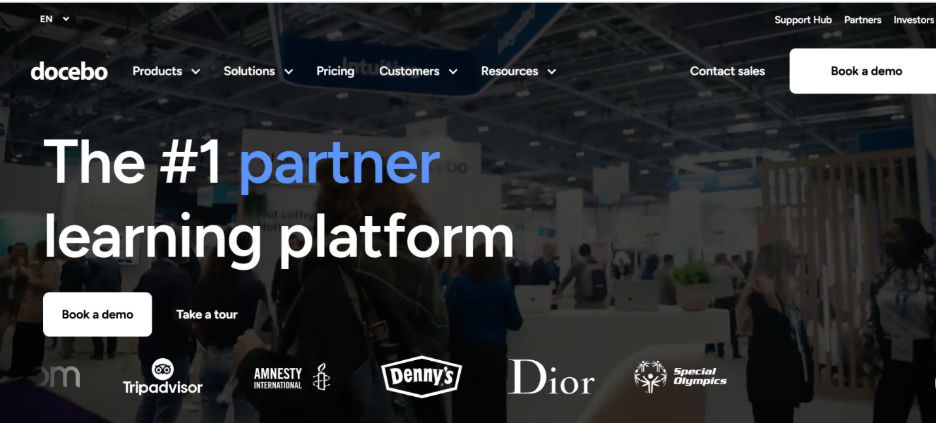
Description: Docebo is an enterprise-grade LMS known for AI-powered personalization and scalability. It’s popular among global corporations.
Key Features:
- AI-driven learning paths
- Extended enterprise training support
- Advanced analytics and dashboards
- eCommerce module for selling courses
- Compliance and certification tracking
Pricing: Custom quote-based pricing for mid to large enterprises.
Integration: Integrates with Salesforce, Workday, Zoom, Microsoft Teams, and Google Workspace.
5. Absorb LMS – Corporate Learning with Analytics
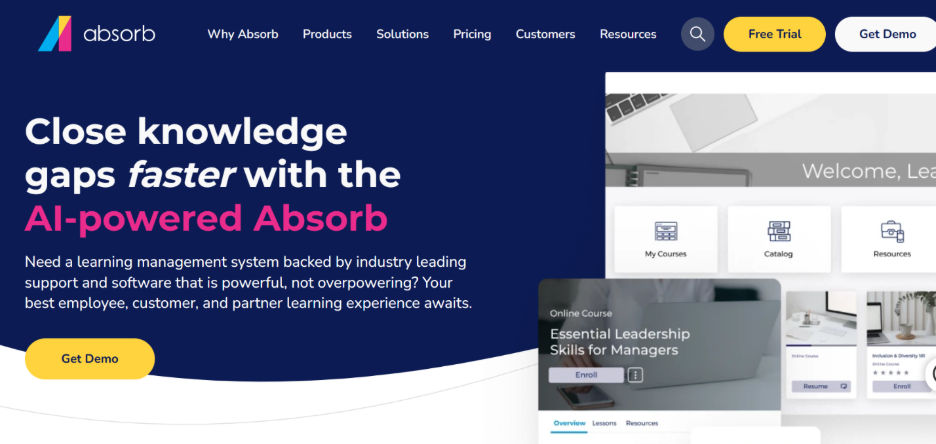
Description: Absorb LMS is designed for corporate training, compliance, and learner engagement, with a focus on powerful reporting.
Key Features:
- Easy course creation and content library access
- Compliance and certification tracking
- Analytics with custom reporting
- Learner engagement tools (surveys, polls)
- Mobile-responsive learning
Pricing: Quote-based, depending on users and features.
Integration: Connects with HRIS, CRM, and productivity apps like Salesforce and Microsoft Teams.
6. LearnUpon – Blended Learning Simplified
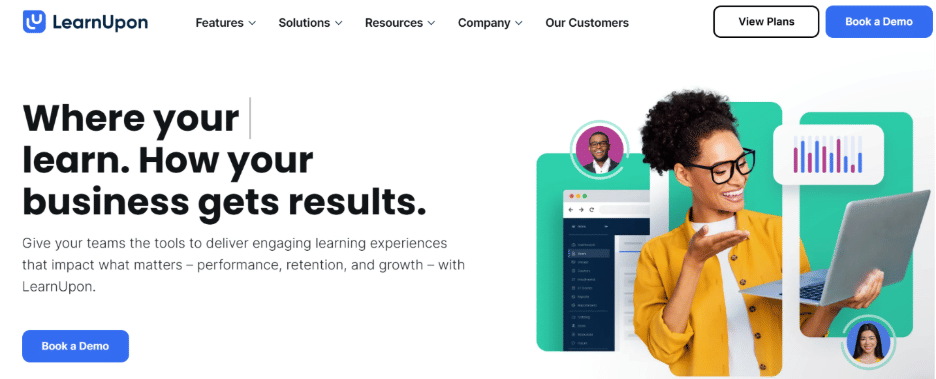
Description: LearnUpon supports both employee and partner training, making it a good fit for companies training multiple audiences.
Key Features:
- Multi-portal setup for different audiences
- Blended learning: combines in-person and online training
- Custom branding and white-labeling
- Reports and analytics dashboard
- SCORM-compliant
Pricing: Quote-based; tiers available for SMBs and enterprises.
Integration: Works with Salesforce, Zoom, HR systems, and Google Workspace.
7. 360Learning – Collaborative Learning LMS
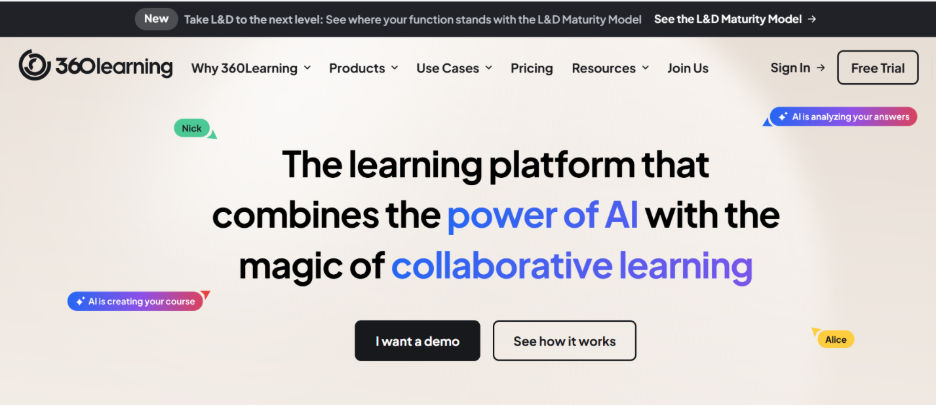
Description: 360Learning blends formal training with social learning, encouraging peer-to-peer course creation and knowledge sharing.
Key Features:
- Collaborative course authoring
- Peer-to-peer learning features
- Discussion boards and social feeds
- Mobile-first design
- Analytics for learner engagement
Pricing: Plans start at $8 per user/month.
Integration: Integrates with Salesforce, Slack, Microsoft Teams, and HR tools.
8. SAP Litmos – Compliance-Focused LMS
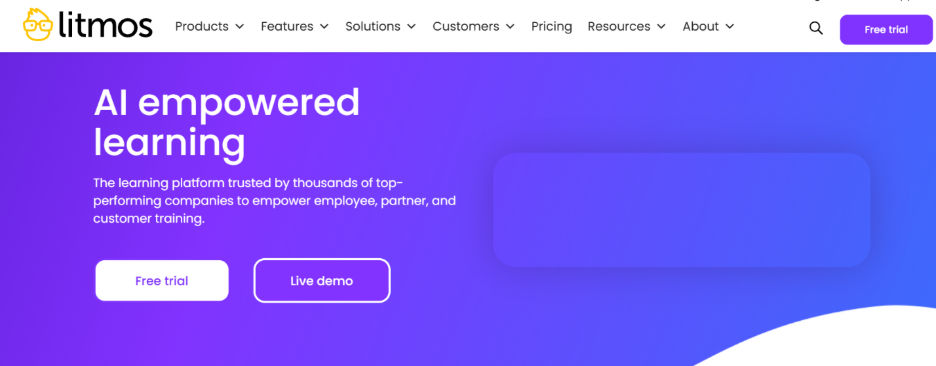
Description: SAP Litmos is designed for enterprise learning with a strong emphasis on compliance and scalability.
Key Features:
- Large content library of ready-made courses
- Compliance training and certification
- Mobile-friendly platform
- Gamification and engagement features
- Enterprise-grade reporting
Pricing: Custom pricing depending on company size and features.
Integration: Integrates with SAP ERP, Salesforce, HR systems, and Microsoft tools.
9. Adobe Learning Manager – Modern Corporate LMS

Description: Adobe Learning Manager (formerly Captivate Prime) is a corporate-focused LMS that delivers engaging, multimedia-driven training experiences. It’s widely adopted by enterprises looking for a sleek, modern interface and strong integration with existing business tools.
Key Features:
- AI-based personalized learning recommendations
- Multimedia course creation with video and interactive content
- Gamification with badges, points, and leaderboards
- In-depth analytics and reporting
- Mobile learning for anytime access
Pricing: Subscription-based; pricing varies depending on active users and features.
Integration: Connects with Adobe Creative Cloud, Microsoft Teams, Salesforce, and other enterprise platforms.
10. Cornerstone OnDemand – Enterprise Learning & Talent Development

Description: Cornerstone OnDemand is an enterprise-grade LMS that combines learning, talent management, and workforce development in one platform. It’s widely used by global organizations for large-scale training and employee growth.
Key Features:
- End-to-end talent and learning management
- Personalized learning recommendations
- Compliance and certification programs
- Performance tracking and employee development tools
- Advanced analytics and reporting
Pricing: Quote-based pricing, tailored for mid to large enterprises.
Integration: Integrates with HRIS, ERP, Microsoft Teams, Salesforce, and other enterprise applications.
LMS for Different Personas
A Learning Management System (LMS) adapts to different roles, making learning easier and growth faster across organizations.
For HR Managers
Simplify onboarding, compliance, and employee engagement with automated workflows that save hours each week. According to LinkedIn Learning, 94% of employees would stay longer at companies that invest in their learning. An LMS also reduces errors by centralizing all HR-related training in one place.
For Corporate Leaders
Get real-time insights into workforce skills, productivity, and ROI. A scalable LMS aligns training with business goals and keeps teams future-ready. Leaders can also use analytics to forecast future skill gaps and plan training investments strategically.
For Educators & Schools
Create interactive lessons, track student progress, and support hybrid or remote classrooms. Students enjoy easy access to resources while teachers save time on grading. An LMS also improves parent-teacher communication by providing clear progress reports.
For Small Businesses
Affordable LMS platforms bring big value at low cost, making it easy for startups and small teams to onboard, train, and grow without stretching budgets. They also help small businesses compete with larger players by giving employees the same high-quality training experience.
SHRM reports that organizations with strong learning cultures are 92% more likely to innovate faster. With the right LMS, every persona gains tools to perform better, learn continuously, and contribute to long-term success.
How to Choose the Best Learning Management System
Selecting the right Learning Management System (LMS) is not just about ticking off a feature list, it’s about finding a solution that supports your organization’s long-term goals. The best LMS will not only simplify training but also enhance engagement, ensure compliance, and provide measurable ROI.
Key factors to consider:
Ease of Use – A user-friendly LMS encourages higher adoption rates. If employees or students find the system confusing, they won’t use it effectively. An intuitive design ensures training becomes part of daily routines without extra frustration.
Scalability – Your business may be small today, but it won’t stay that way forever. The best learning management system should grow with you, handling more users, courses, and locations without performance issues.
Integration – An LMS should connect smoothly with your existing ecosystem, including Microsoft Teams, HR software, CRM systems, or project management tools. This ensures seamless workflows and eliminates duplicate data entry.
Customization – Every business has unique processes. The ability to tailor workflows, create branded portals, and customize course structures ensures the LMS reflects your culture and meets specific needs.
Support & Training – Even the best software requires guidance. Look for vendors that offer structured onboarding, knowledge bases, and 24/7 customer support to keep your teams confident and productive.
Cost vs. Value – Subscription fees matter, but true value comes from ROI. Consider time saved on manual processes, increased productivity, reduced turnover, and improved compliance when evaluating the real cost.
Security & Compliance – Protecting sensitive employee or student data is non-negotiable. Choose an LMS with encryption, audit trails, and compliance with regulations like GDPR, HIPAA, or SOC 2.
Analytics & Reporting – Data is essential for decision-making. A strong LMS should offer detailed analytics on learner progress, engagement rates, and skill gaps. This helps leaders align training with performance outcomes.
Mobile Learning Capability – In today’s world, learning happens everywhere. Ensure the LMS supports mobile devices so learners can access training anytime, whether at home, in transit, or on-site. Mobile access improves flexibility and completion rates.
The Future of Simple Learning Management System
The best learning management systems of tomorrow will not just deliver training they will shape how organizations innovate, grow, and retain talent. As digital learning evolves, LMS platforms will become smarter, more immersive, and deeply connected to everyday work.
AI-Driven Personalization – Future LMS platforms will use artificial intelligence to tailor courses to each learner’s pace, role, and preferences, creating a personalized journey for maximum impact.
Microlearning Modules – Training will shift to short, bite-sized lessons that fit easily into busy schedules, making learning faster, easier, and more effective.
Gamification & VR Training – Immersive learning experiences using gamification, virtual reality, and augmented reality will make training more interactive, motivating, and practical.
Predictive Analytics – Advanced data analytics will allow organizations to identify skill gaps, forecast workforce needs, and reduce attrition risks before they become problems.
Mobile-First Learning – Learning on smartphones and tablets will dominate, with offline capabilities ensuring access anytime, anywhere even without internet.
Social & Collaborative Learning – Employees will co-create content, share knowledge, and learn from peers, building stronger communities and more engaged teams.
Integration with Workplace Tools – LMS platforms will blend seamlessly with daily productivity apps like Microsoft Teams, Slack, and project management systems, embedding learning into regular workflows.
Learning Experience Platforms (LXP) – The line between LMS and LXP will blur, with systems offering not just structured courses but also curated content such as podcasts, videos, and articles tailored by AI.
Continuous Performance Feedback – Training will connect directly with performance management, giving employees real-time feedback alongside resources to strengthen their skills instantly.
Global Compliance & Localization – As companies expand worldwide, LMS platforms will support multiple languages, regional regulations, and cultural needs, ensuring training remains inclusive and compliant everywhere.
According to Gartner, by 2026, 70% of organizations will use AI-powered LMS platforms to personalize employee learning journeys, proving that the future of training is intelligent, adaptive, and deeply human-centered.
Conclusion
The workplace of 2025 demands smarter, faster, and more engaging training methods. A Learning Management System is not just a digital tool it’s a growth partner. From onboarding to compliance, from schools to enterprises, LMS platforms save time, boost productivity, and keep learners motivated.
Those who act today will lead tomorrow. Those who wait risk falling behind competitors already investing in digital learning transformation. Choosing the best learning management system now means preparing your workforce, students, and business for long-term success.
Book a Demo
Ready to see how a Learning Management System can transform your organization?
Book a demo today and get a personalized walkthrough. Experience the future of learning with a 14-day free trial and discover how the best LMS can help your teams grow smarter, faster, and stronger.
Join Our Creative Community
Frequently Asked Questions
What is a Learning Management System (LMS)?
A Learning Management System is a software platform that delivers, manages, and tracks training or education. It helps organizations reduce errors, cut costs, and create engaging learning experiences.
Which is the Best Learning Management System for small businesses?
The best LMS for small businesses is one that’s affordable, easy to use, and scalable. Popular options include TalentLMS and HRMS-based platforms that simplify onboarding and compliance.
Is an LMS expensive for startups?
Not necessarily. Many providers offer flexible plans starting at just a few dollars per user per month. Cloud-based solutions make LMS affordable while still delivering enterprise-level features.
Why is an LMS important in 2025?
With hybrid workplaces and rapid digital transformation, businesses need consistent, scalable training solutions. An LMS ensures compliance, boosts engagement, and improves retention rates.
How do I choose the Best Learning Management System?
Focus on ease of use, scalability, integration with existing tools, and support services. The best LMS should grow with your business while ensuring security and compliance.
What industries benefit most from LMS platforms?
LMS platforms are widely used in corporate training, healthcare, finance, education, and manufacturing. Any industry that values compliance, continuous learning, and skill growth can benefit.
What makes a Simple Learning Management System ideal for growing teams?
A Simple Learning Management System focuses on ease of use, quick setup, and clear learning paths without unnecessary complexity. It helps growing teams roll out training faster, keep learners engaged, and manage courses without needing technical expertise or dedicated administrators.
Can a Simple Learning Management System support employee growth over time?
Yes, a Simple Learning Management System supports continuous employee growth by organizing learning content, tracking progress, and encouraging skill development in a structured way. As teams grow, it provides consistency in training while remaining flexible enough to adapt to evolving learning needs.
Blog Categories
Power Productivity—Start Today
All Your Work, One Smart Platform
Your Team's New Favorite Workspace
Organize, Collaborate, and Thrive—For Free




_JiluXJRGNl.svg)























